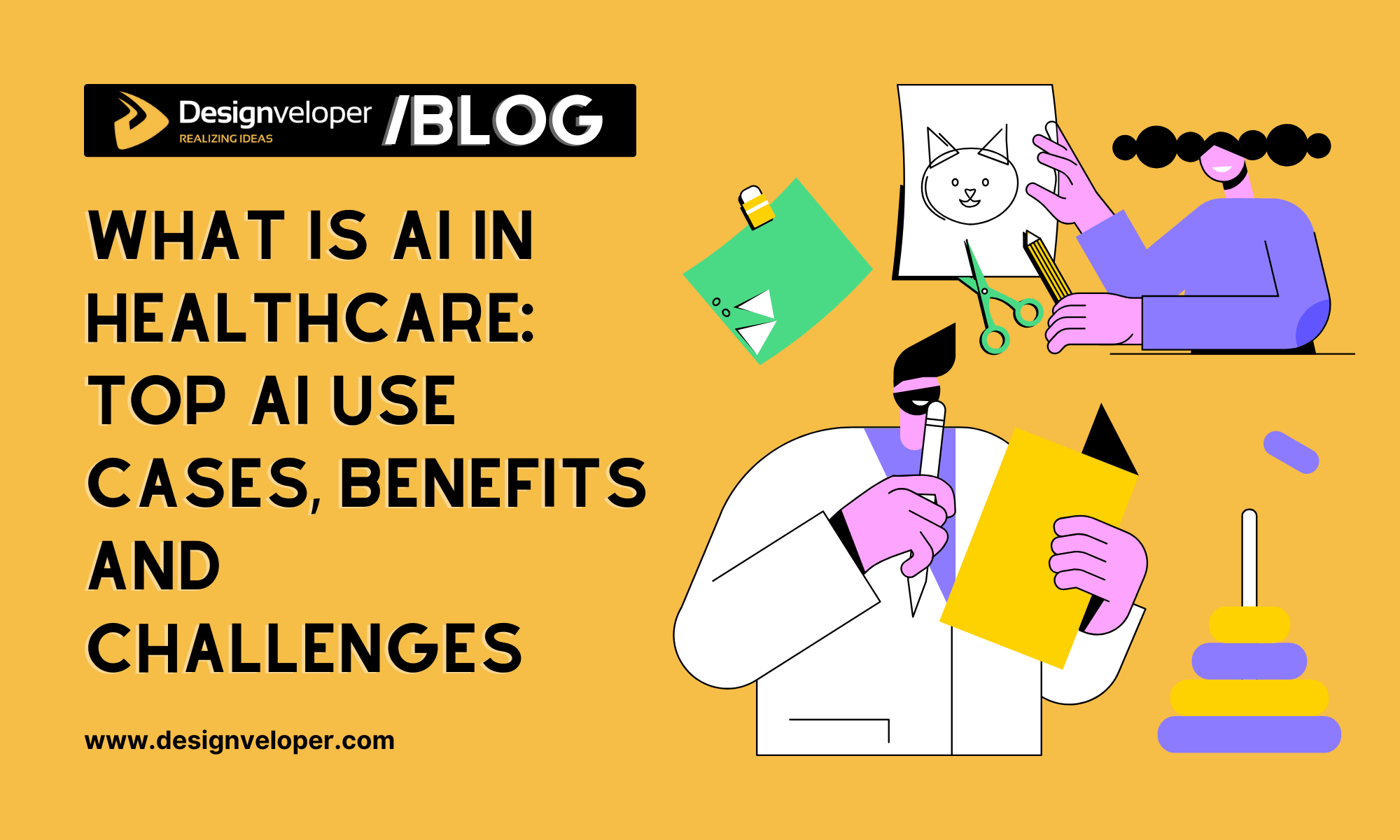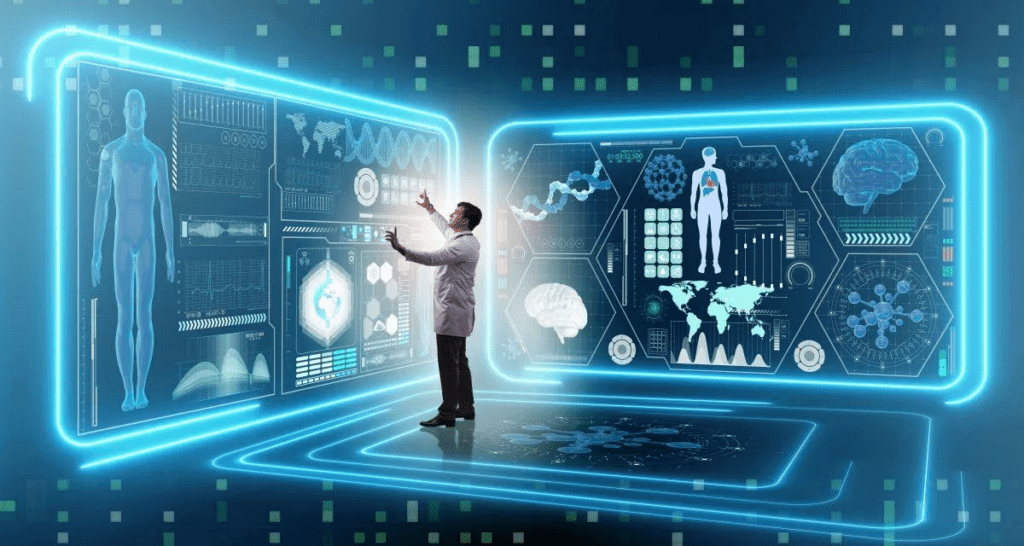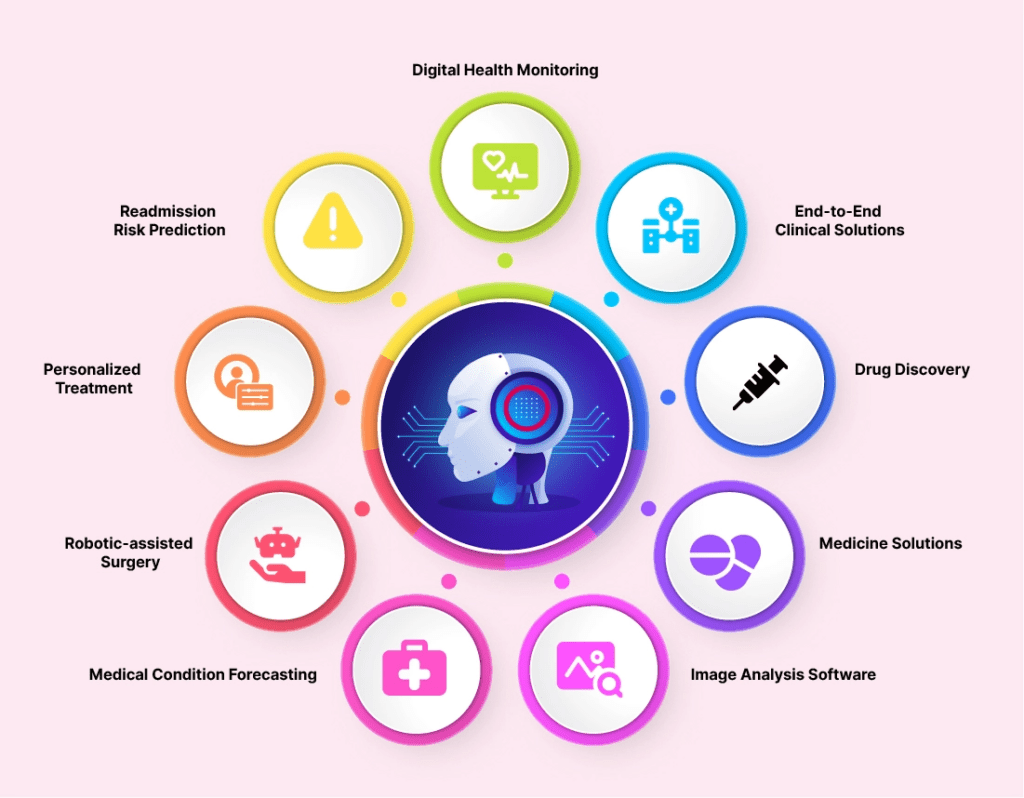What is AI in Healthcare: Top AI Use Cases, Benefits and Challenges

AI in healthcare is transforming how we diagnose, treat, and monitor patients. From predictive analytics to robotic surgeries, AI-powered solutions are reshaping medical services for better efficiency and outcomes. If you’re looking to build tailored AI solutions, explore our healthcare software development services to accelerate innovation and improve care delivery.
This article explores the leading AI use cases, their advantages, and the ongoing challenges healthcare providers face.
Key Takeaways
- Market Growth: The global AI in healthcare market is expected to reach $115 billion by 2025, growing at a CAGR of over 40%.
- Efficiency Boost: AI-powered tools can reduce diagnostic errors by 30% and cut administrative tasks by 70%.
- Adoption Rate: Over 85% of healthcare providers are planning to integrate AI-based solutions into their workflows by the end of 2025.
What is AI in Healthcare?

Artificial Intelligence in healthcare refers to the use of machine learning algorithms and data analytics to assist in clinical decisions, automate administrative processes, and improve patient outcomes. It supports various tasks—from diagnostics to personalized treatment plans—making healthcare more predictive, preventative, and patient-centered.
How does AI in Healthcare Work?
AI in healthcare works by collecting and analyzing vast amounts of medical data, including patient records, imaging results, and genetic information. Algorithms are trained using historical data to detect patterns and make predictions. For example, machine learning can flag early signs of diseases, while NLP (Natural Language Processing) helps interpret clinical notes. Deep learning models aid radiologists in identifying anomalies in imaging scans.
AI systems also learn continuously from new data, enabling adaptive improvement over time. Integration with EHRs (Electronic Health Records) and IoT medical devices further enhances their capabilities, offering real-time insights, automating workflows, and reducing human error. Importantly, human supervision is maintained to ensure clinical safety and regulatory compliance.
AI Use Cases in Healthcare
AI is applied in numerous healthcare scenarios, driving efficiency and accuracy across systems. Below are some of the most impactful use cases:
Patient Data Analysis
AI systems analyze structured and unstructured patient data to identify trends, risk factors, and care gaps. This supports early interventions and better health outcomes through predictive insights.
Medical Record Summarization
NLP-driven AI tools can extract key points from lengthy medical records, offering physicians a concise summary that saves time and enhances decision-making.
Diagnostic Assistance
AI assists in diagnosing conditions like cancer, diabetes, and neurological disorders by comparing patient data against known patterns with high accuracy.
Treatment Plan Generation
AI suggests personalized treatment plans based on patient history, genetic data, and clinical guidelines, ensuring tailored and evidence-based care.
Drug Discovery Support
Machine learning accelerates the drug discovery process by identifying promising compounds and simulating their interactions, significantly reducing time and cost.
Clinical Trial Optimization
AI identifies suitable candidates for clinical trials by analyzing EHRs, improving trial matching accuracy, and speeding up the recruitment process.

Health Education and Training
AI-powered simulations and virtual patients enhance medical training, offering immersive learning experiences and improving clinical skills in a risk-free environment.
Discharge Planning Support
AI helps create efficient discharge plans by predicting patient recovery paths and resource needs, reducing hospital stays and readmissions.
Medical Error Reduction
AI flags inconsistencies and alerts healthcare providers to potential mistakes, lowering the risk of medical errors and improving patient safety.
Report Generation
AI tools automate the creation of diagnostic and administrative reports, reducing the burden on clinicians and ensuring consistency in documentation.
Risk Factor Identification
Predictive models identify patients at high risk of chronic conditions or complications, enabling preventive care and resource optimization.
Multi-lingual Clinical Text Support
AI supports translation and interpretation of clinical notes across languages, improving accessibility and understanding in multicultural settings.
Compliance Monitoring
AI ensures adherence to healthcare regulations and standards by continuously auditing processes and flagging discrepancies for review.
Here’s your updated block with the keyword “artificial intelligence development solutions” naturally integrated for SEO without breaking readability or flow:
Benefits of AI in Healthcare
Artificial Intelligence is not just a technological trend—it’s a powerful enabler of smarter, faster, and more personalized medical care. By integrating AI into healthcare systems, providers can enhance clinical decision-making, optimize resource use, and deliver more precise patient outcomes. Leveraging advanced artificial intelligence development solutions, healthcare organizations can accelerate digital transformation and unlock measurable improvements in both patient and operational outcomes. Below are the core benefits AI brings to the industry:
Improved diagnostic accuracy
AI-powered tools can analyze medical images, lab results, and patient histories with remarkable precision, reducing diagnostic errors and enabling early disease detection.
Faster decision-making
Real-time data analysis and AI-generated recommendations support physicians in making quicker, more informed treatment decisions.
Operational efficiency
AI automates routine tasks such as scheduling, billing, and medical coding, allowing healthcare staff to focus on patient care.
Reduced administrative workload
Natural Language Processing (NLP) tools help summarize patient notes and generate documentation, saving hours of manual entry for doctors and nurses.
Enhanced patient engagement
AI-driven chatbots and virtual assistants provide patients with 24/7 access to basic healthcare information, appointment reminders, and follow-up care support.
Better resource allocation
Predictive analytics can forecast patient admission rates, ICU usage, and staffing needs, allowing facilities to better prepare and optimize resources.
Challenges of AI in Healthcare
While the potential of AI in healthcare is significant, several critical obstacles stand in the way of its widespread adoption. These challenges span technology, policy, ethics, and workforce readiness—and they must be addressed to ensure AI delivers safe, equitable, and effective care. Here are the most pressing concerns:
- Data privacy and security concerns
Handling sensitive patient data requires robust cybersecurity and strict compliance with regulations like HIPAA and GDPR. Data breaches can lead to severe legal and ethical issues. - Bias in training data and algorithms
If the data used to train AI models is unbalanced or incomplete, it can lead to biased outcomes—particularly affecting underrepresented populations. - High implementation costs
AI infrastructure demands significant upfront investment in software, hardware, and staff training, which can be a barrier for smaller institutions. - Complexity of integration with legacy systems
Many healthcare providers still rely on outdated IT systems, making integration with modern AI solutions complex and time-consuming. - Regulatory and ethical hurdles
Ensuring that AI applications meet clinical safety standards, gain regulatory approval, and operate within ethical boundaries is a long and evolving process. - Lack of digital literacy among staff
Successful AI deployment requires healthcare professionals to understand and trust these tools—necessitating comprehensive education and change management initiatives.
Addressing these challenges is essential to ensure that AI technologies enhance healthcare delivery without compromising patient trust, equity, or safety.
Conclusion
AI is revolutionizing the healthcare industry by enabling smarter diagnostics, streamlined operations, and personalized treatments. As adoption increases, so does the need for ethical, secure, and well-integrated AI solutions. While challenges remain, the long-term potential of AI to transform global healthcare is undeniable.

















































